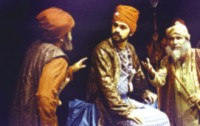|
Theatre
Shesh Shonglap -
The law has the last say
Shudeepto Ariquzzaman
 |
A scene from Shesh Shonglap. |
Shesh Shonglap is the Bengali translation of Sultanuj Jannam (Sultan's Dilemma) composed by Tawfiq Al Hakim, credited for hundred plays and considered one of the best cultural personalities in the Middle East. Bengali theatre owes much to this gentleman and it is reflected through the Bengali version of the play "Shesh Shonglap" which gives out a strong message of moral and political responsibilities, something our political leaders will do well to contemplate. Although the stage is set against the backdrop of the 13th century, the message that the play conveys applies thoroughly to the 21st century.
"Shesh Shonglap" (the Final Dialogue) was staged at the premises of the Experimental Theatre hall, Shilpakala Academy organised by Shomoy Sanstritik Goshti. The previous week had been a busy one for those involved in theatre. Yet, that did not deter a high turnout of spectators, glad to spend their Friday evening enjoying a good stage play at Shilpakala Academy.
The play begins with the executioner getting ready for his work. The victim is a slave trader who has been boasting in the marketplace on how he sold the Sultan for a thousand dinars forty years ago. The result is predictable- the Wazir (chief administrator) arranges for his death penalty to be carried out after the Fajr (morning) prayers.
By this time, the Sultan himself arrives at the scene. The victim pleads for justice and the Wazir furiously informs the Sultan of what he has said. Surprisingly, the Sultan, albeit a bit sad that he has been sold so cheaply, reaffirms the fact that he indeed was a slave but his master, the previous Sultan has freed him from serfdom.
Now the problem starts, as the Wazir apparently has failed to obtain the document of liberty from the Sultan. Under the laws of the state, when an owner does not bequeath any of his property to any heir, it becomes property of the state that has to be sold at the auction. So the Sultan has two choices. The first choice is the one that has traditionally worked- use the sword and get rid of the trouble. The alternative is to conduct the proceedings according to the rule of law and the Sultan agrees that he should be sold at the auction only to be freed later.
The citizens are thoroughly confused, how can a Sultan be bought at the auction? Nevertheless, the populace considers the Sultan as an exceptional ruler, under whose rule everybody is equal in the eyes of the law, including the Sultan himself. Unfortunately for the Sultan, the highest bidder is no one but a lady who has earned the rather unenviable social reputation of being the best prostitute in town.
The play carries a moral message- the rule of law should be respected under the gravest of circumstances. Everybody including the Sultan is equal in the eyes of the law. The sword can come in handy in times of crisis but it offers no long-term solution. Weapons can be a man's best friend and his worst enemy. As the Qazi says to the Sultan in the play- "your weapons have taken you to great heights, but they can also take you down." The character of the Sultan especially is worth contemplating. He is a brave warrior who has led his nation against the barbaric Mongols and triumphed. During the crisis, he could have easily ordered the execution of the slave trader, or the Qazi who disputed him or the prostitute who refused to free him from bondage. Instead he undergoes the due legal process. It is a difficult thing to do and viewed through the eyes of others, the legal process could have resulted in his downfall.
The moral integrity of the prostitute is another issue of this play. Despite her reputation, whenever any injustice takes place, she is the one who rushes to the spot. In every society, east or west, prostitutes are considered the scum of earth. But when we view matters in a different light, sometimes they are better people.
Although the play reflects more or less on serious issues, it is supplemented by humorous entertainment. Anecdotes and dialogues evoked bursts of laughter from the audience. Altogether the play is inspirational to those who believe in upholding the rule of law and that everyone is equal before the law.
Copyright
(R) thedailystar.net 2010
|

